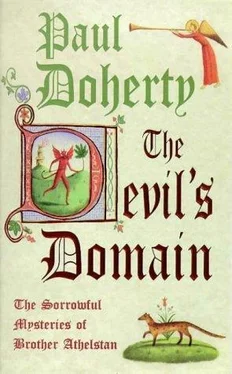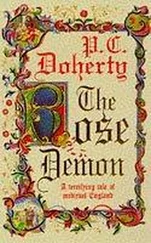Paul Doherty - The Devil's domain
Здесь есть возможность читать онлайн «Paul Doherty - The Devil's domain» весь текст электронной книги совершенно бесплатно (целиком полную версию без сокращений). В некоторых случаях можно слушать аудио, скачать через торрент в формате fb2 и присутствует краткое содержание. Жанр: Исторический детектив, на английском языке. Описание произведения, (предисловие) а так же отзывы посетителей доступны на портале библиотеки ЛибКат.
- Название:The Devil's domain
- Автор:
- Жанр:
- Год:неизвестен
- ISBN:нет данных
- Рейтинг книги:5 / 5. Голосов: 1
-
Избранное:Добавить в избранное
- Отзывы:
-
Ваша оценка:
- 100
- 1
- 2
- 3
- 4
- 5
The Devil's domain: краткое содержание, описание и аннотация
Предлагаем к чтению аннотацию, описание, краткое содержание или предисловие (зависит от того, что написал сам автор книги «The Devil's domain»). Если вы не нашли необходимую информацию о книге — напишите в комментариях, мы постараемся отыскать её.
The Devil's domain — читать онлайн бесплатно полную книгу (весь текст) целиком
Ниже представлен текст книги, разбитый по страницам. Система сохранения места последней прочитанной страницы, позволяет с удобством читать онлайн бесплатно книгу «The Devil's domain», без необходимости каждый раз заново искать на чём Вы остановились. Поставьте закладку, и сможете в любой момент перейти на страницу, на которой закончили чтение.
Интервал:
Закладка:
Paul Doherty
The Devil's Domain
CHAPTER 1
‘A time of bloody tribulation! Of horrid sights! The season of murder and subtle trickery!’ is how the chronicler of Westminster described the late summer of 1380. The old monk sat in his carrel overlooking the cloister garth, scratching the edge of his quill against his unshaven cheek. How could he truly describe these times? The King was only a boy; the Regent, his uncle John of Gaunt, that bloody man of war, ruled the kingdom. Some even whispered he wanted it for himself. The French were at sea, their war fleets attacking the English galleys and cogs along the sea lanes from Bordeaux to Calais. At home, the summer harvest had been good; prices, however, still climbed out of the reach of the poor who swarmed along the highways over Southwark Bridge and into the city.
The kingdom was waiting! All the signs and portents were there. A coffin had been seen in the skies above St Paul’s: draped in a ghostly pall, it had moved from east to west before disappearing into the low, threatening clouds to the north of the city. Many said that was where the danger would arise, from the fields and villages north of Cripplegate. The men of the soil, the earthworms, who laboured and spun so the great ones could clothe themselves in silk and ride great destriers, drink deep of the blood-red claret and count their silver and gold coins. In the streets of London, sepulchral voices were heard crying woe, prophesying disaster. Black-draped barges, rowed by ghostly hands, were glimpsed on the river shooting the turbulence under London Bridge. Were these, the gossips chattered, the ghosts of men who had defied the Regent and lost their heads which, salted and pickled, decorated pikes along the rail of that same London Bridge?
The chronicler’s brothers and monks at Westminster said such signs were mere trickery and foolish chatter. The peasants, now well organised and calling themselves the ‘Great Community of the Realm’, were despatching troublemakers, traitors, inciters to rebellion and treason into the city, stirring up trouble along its foul alleyways and runnels. Others, less worldly, shook their heads. These signs, surely, were warning of horrors yet to come? Had not a holy man, who claimed to have wandered in the deserts of Palestine, had visions which he preached, at a penny a time, from the cross of St Paul’s? How God was planning to sweep London with fire? To bring it as low as hell, to leave not one stone upon another?
In the cemetery of St Erconwald’s, Pike the ditcher and Watkin the dung-collector reflected on these rumours. They sat beneath the old yew tree sharing a wineskin and staring up at the starlit sky. They were both drunk as hogs. They should have gone home. However, a few blackjacks of ale in the Piebald Tavern, followed by a cup of canary, a gift from Joscelyn the one-armed taverner, and Pike and Watkin had rolled out into the streets feeling like great lords of the land. They shared their pennies and, before they’d left, bought a bulging wineskin.
‘Be careful,’ the taverner had warned, watching these two fellow parishioners sway backwards and forwards on their feet. ‘You’ve drunk enough. You should go home and sleep it off!’
‘We are not thrunk!’ Watkin scoffed. ‘I just wisth your bloody floor would stay still. This is a tavern, not one of your bloody cogs of war!’
Joscelyn had sighed in exasperation. The two men had wished him good night.
‘Where are you going to?’ Joscelyn called curiously as he followed them to the doorway.
He smiled at Cecily the courtesan who, arm in arm with a young fop, was strolling down towards the fields south of the Bishop of Winchester’s inn: a famous trysting place for the likes of Cecily and her customers. Cecily waved her fingers. Pike the ditcher watched her go and licked his lips even though his wife had warned him off.
‘If I catch you with that trollop again,’ she’d screeched, ‘you’ll be nothing more than a gelding!’
Pike swayed and put one mud-covered hand on Watkin’s shoulder.
‘We’d best be going,’ he slurred.
‘Go where?’ Joscelyn repeated.
Watkin tapped his fleshy nose and winked. ‘Secrets,’ he slurred. ‘Great secrets.’
Joscelyn stepped back and glanced round nervously. Were the rumours true, he wondered? Were these two rapscallions members of the Great Community of the Realm? Plotting treason and rebellion against John of Gaunt? If that was the case he wanted no more of it! Gaunt had a way of dealing with traitors: hanged like rats on the gallows at Smithfield or on the other side of London Bridge. Spies abounded in Southwark, more than fleas on a mongrel’s back.
‘Take care!’ he warned. Joscelyn retreated into his taproom closing the door firmly behind him.
Watkin and Pike had stumbled along to the church, gone through the lych gate and taken up residence beneath the yew tree at the far end of God’s acre, the broad cemetery which bounded the old church of St Erconwald’s. They had drunk and waited, watching the sun set and the stars come out. Then they had seen it, on the top of the church tower, a slight glow from a charcoal brazier.
‘He’s up there,’ Pike said, referring to their parish priest the Dominican Brother Athelstan. ‘He’s up there watching his bloody stars! Him and that cat of his. What’s its name? Eh? Benedicta?’
‘Benedicta!’ Watkin laughed. ‘That’s the widow woman, you know, dark-faced and dark-eyed with a softness for Brother Athelstan.’ He leaned conspiratorially closer. ‘The name of his one-eyed cat is Bonaventura.’
‘Do you think it’s true?’ Pike continued.
‘What is?’
‘That he left St Erconwald’s…’
Watkin felt a chill of apprehension, which almost sobered him up. Such rumours and stories had been rife in the parish, fiercely discussed on the church steps or in the Piebald Tavern. Watkin knew he was a sinner. He drank too much, he swore, he fought, he lusted after other men’s wives. Nevertheless, he feared God in heaven and the Lord Jesus; but Watkin loved their small parish priest with his olive-skinned face, dark, soulful eyes and brain as sharp as a razor. Athelstan made Watkin feel good about himself. Every so often, the Dominican would pat the fat dung-collector on the shoulder.
‘What you do, Watkin, cleaning the muck in filthy alleyways, is loved by God. You are like the Holy Ghost.’
Watkin had seen the laughter in the Dominican’s eye.
‘You make things clean and fresh! Therefore, Watkin, in God’s plan, you are very important!’
Watkin had never forgotten that. He had been frightened by the rumours that John of Gaunt had taken a savage dislike to the little friar and arranged for his transference to the Halls of Oxford. They claimed Athelstan had got as far as Cripplegate before Prior Anselm had intervened and sent a message ordering the Dominican back to his parish. Athelstan had never said anything but, there again, he was unlikely to do so, Watkin mused. And Watkin, although leader of the parish council, dare not challenge him. Athelstan had a dark side. If he lost his temper, his tongue was like a lash. Watkin loved him yet he was more frightened of Athelstan than he was of the Regent’s men-at-arms or even the great coroner Sir Jack Cranston who’d come swaggering into Southwark, one hand on his sword belt, the other clutching a wineskin.
Watkin often reflected on the relationship between Cranston and his secretarius Athelstan but he couldn’t reach any conclusion. Cranston was as big as Athelstan was little. He could, and often did, drink the entire taproom of the Piebald Tavern under the table. He could swear like any soldier. He had the ear of many powerful men in the city. They even said the young King deferred to him but Cranston could do nothing unless Athelstan was by his side.
Читать дальшеИнтервал:
Закладка:
Похожие книги на «The Devil's domain»
Представляем Вашему вниманию похожие книги на «The Devil's domain» списком для выбора. Мы отобрали схожую по названию и смыслу литературу в надежде предоставить читателям больше вариантов отыскать новые, интересные, ещё непрочитанные произведения.
Обсуждение, отзывы о книге «The Devil's domain» и просто собственные мнения читателей. Оставьте ваши комментарии, напишите, что Вы думаете о произведении, его смысле или главных героях. Укажите что конкретно понравилось, а что нет, и почему Вы так считаете.












